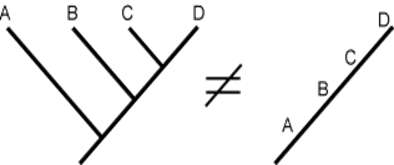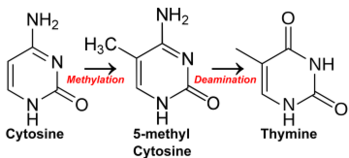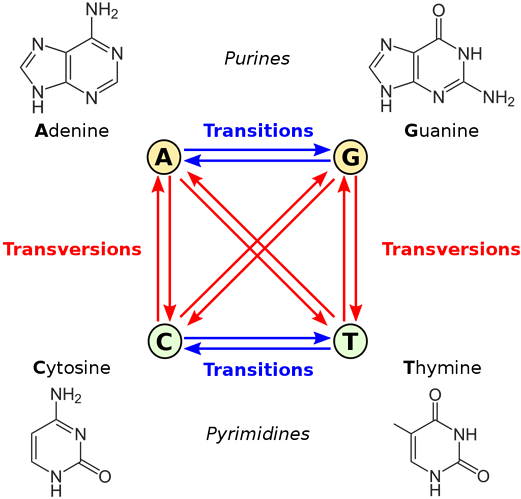You deny speciation via evolution.
Is just the same argument is about commonality. It is not “proof” as such, it is a conclusion.
No, and no. You are still concluding. You are deciding what the similarity means from your presupposition of what you want it to mean.
Funny, all the early Homo derivatives identified died out as the line progressed. Why not the Chimps?
Richard
Without god, yes. If God is the instigator I deny nothing. But God is not a part of random evolution.
Richard
God is sovereign. What’s random?
Not controlled by God. Urmine and Thurumine were examples of humans thinking that God controlled chance. It died out.
I believe in chance, without it there is no freedom. If every minutae is controlled by God then I am an automaton with no free will destined to follow the path before me. There would be no sin either, because God would not permit it.
Richard
For plants a single mutation can result in offspring of the parent plant that can reproduce with each other but not the original members of the population. Once the species are isolated further changes in one group do not get passed to the other. This leads to a gradually widening gulf between them.
But this puts to rest the common objection that new species have never been observed.
Interesting question. I suspect it has to do with competition for the same resources, which ultimately Homo sapiens excelled at, plus assimilation, as we still carry those genes in our DNA, and they are a part of us; Chimps however, are in a different linage and occupy a different niche in the environment, so were not in direct competition with early Homo species. Certainly, there were probably chimp precursors contemporary with early humans that died out as current chimps evolved.
If you allow for God’s existence independent of time, as in atemporal, or that he is all through time, as in omnitemporal, no one’s freedom is impaired. God’s relationship to us who are constrained to linear sequential time is a wonderful mystery, dynamic and cooperative, but God’s will is accomplished, regardless of our choices. Reread the citation from Proverbs. It sure seems as if you are denying it.
You said you were going to engage with the evidence, but that piece has nothing to do with commonality – it has to do with differences. Did you read it?
I am denying nothing and you are getting on my nerves with your accusations. I have a good mind to report them. God’s will has nothing to do with chance. God’s omnipotence negates chance because He already knows the result. It also ignores personal choice because He knows what choices are made rather than dictates what they are. IOW if Judas hadn’t betrayed Christ someone else in the group would have. That was All God needed to know.
Richard
I read it. It read like my old Calculus lessons. I just looked again and to be honest you could have been speaking Chinese. But, from what I can gather it involved using a formulae which achieved what you wanted to achieve. I could not tell the derivation of the formulae, whether it was gleaned or calculated. There was nothing I saw to actually prove the theoretics actually occured
If you believe that proves something I guess I will have to take your word for it, but you will have to dumb it down if you want people to understand it.
It still boils down to a 2% difference that may or may not have been bridged, but the last jump is probably the easiest and, like I said, only would prove that we were created as apes. It does not prove the complete transformation that you (et al) seem to think is a given.
II think we have gone round this house enough.
Rchard
I think you are suggesting that the split to human came before the full evolution of chimps but that the makeup of chimps cut them short of Human cognisance and intelligence. Sorry if I am wrong here. But it would seem to be more to do with shared inheritance than bridging a 2% gap. It would be the direct ancestor who would be assimilated not the parallel evolving chimps. Our relationship to Chimps is therefore as a distant cousin rather than a direct ancestor?
The elephant in the room still remains, that is, the traversing of species, even classes, to get from microbe to Human. The argument of ape and human is comparatively minor.
Richard
If you actually read the article you would know that it is about the differences, not the commonalities.
Why isn’t it proof beyond a reasonable doubt?
Do you know what a hypothesis is? Do you know how hypotheses are used in science?
Do you think evolution predicts that there would only be a single species on Earth if evolution were true?
Yes. The process of evolution resembles a tree, not a ladder.

If we were going to put the apes on that tree:
A. Orangutans
B. Gorillas
C. Chimps (and Bonobos)
D. Humans
If you are stumbling over the mountains of evidence demonstrating common ancestry between chimps and humans, why go further down the tree? Until you understand the evidence the most recent nodes will work just fine.
Also, you may want to check these out:
As I read it, It was about resolving the differences.
Because there is doubt. It is unprovable.
Of course, But just because science classes a hypothesis as good until disproven does not give it any more credence to the non-scientist, or make it any more correct (or false)
No, but each line absorbs its inheritance to a greater or lesser extent, which is why any commonality will be beyond measurement other than for distant cousins or members of the same class. Which rather upsets DNA comparison really. It can only get you so far. It cannot identify the original donor(s) Which, surprise, surprise takes us back to the old “Missing link” theories. (No I am not a believer in the God of the gaps)
Richard
What we are saying is that the same process we see producing mutations in living populations is the same process that caused populations to diverge from one another in the past, resulting in the species we see today. The evidence for this is the pattern of substitution mutations that is discussed in the article we have pointed to.
There is an extrapolation here that pervades all of TOE. That everything can be achieved, given time, and that no deviation or level of mutation/progression is impossible. I am sorry but I disagree. Anything may be possible with God, but Evolution has its limitations. I am sorry that you cannot see them.
Richard
What doubt? Why is it unprovable?
Let’s take this step by step.
Do you agree that there is an observed bias in the substitution mutations we see occurring in living populations? The evidence I am looking at shows that there is a bias towards transitions over transversions.
This bias is due to the chemical similarity between bases. The purines (A and G) have two ring structures while the pyrimidines (C and T) have one ring structures. Therefore, the proteins responsible for copying DNA are more likely to mistake similar bases for each other which biases the types of mutations that occur.
We also have CpG mutations which is due to the C of a two base sequence CG being methylated. When a C is methylated it can go through a chemical change that turns it into T. When copied, this T is copied as an A on the opposite strand. This produces a bias towards CpG mutations.

When we observe mutations in humans we see this bias. Do you agree so far?
That’s not how a hypothesis is used in science. In science, the hypothesis is what we test. When the hypothesis is supported we tentatively accept the hypothesis as correct. When thousands of related hypotheses are supported, we conclude that we have a very well supported theory that encompasses those supported hypotheses. This is how science works.
From what I can see, you reject how science is done. Instead of acknowledging the process of hypothesis testing, you instead call them assumptions, assertions, or just seeing what we want to see. You never seem to understand that they are hypotheses that have been tested and supported over and over and over.
Why would commonality be beyond measurement?
Also, you are forgetting speciation. This is where a population is split into two or more groups. Different mutations will accumulate in each different population which causes them to diverge over time. Again, evolution is a tree, not a ladder. You might as well ask why trees don’t look like telephone poles.
With DNA, we can determine if two species share a common donor. DNA is a direct record of inheritance.
False. We are testing hypotheses. The scientific method pervades all of TOE which is why you see the testing of hypotheses.
Added in edit:
It may be helpful to briefly talk about hypotheses, extrapolations, and assumptions. Let’s use DNA fingerprinting as an example. A forensic scientist finds DNA at a crime scene. He assays the DNA so he can see the pattern of sequences in that DNA. The police arrest a suspect and give the forensic scientist the suspect’s DNA. The forensic scientist uses the same methods to find the patterns of DNA sequence in the subject’s DNA.
The forensic scientist then forms a hypothesis. If the DNA at the crime scene came from the suspect then the two DNA patterns should match. Is the forensic scientist making an assumption? Is the forensic scientist using an extrapolation? Does the forensic scientist proclaim that he can’t consider the possibility of the suspect committing a murder unless the forensic scientist himself witnesses the suspect committing a murder?
Then show me a single genetic difference between humans and chimps that could not be produced by the known mechanisms of mutation.
I cannot see what you cannot present. Show me how it is impossible to get the chimp and human genomes from a common ancestor over a 5 million year period.
Why did you create the thread given that you you have indicated that you are already familiar with the evidence, having seen it all before, are unconvinced, and the replies are hard on your nerves?
